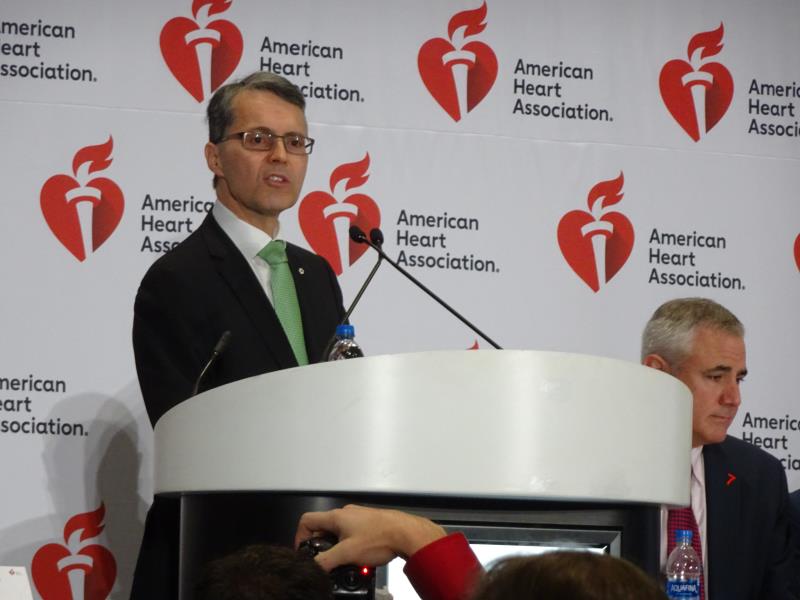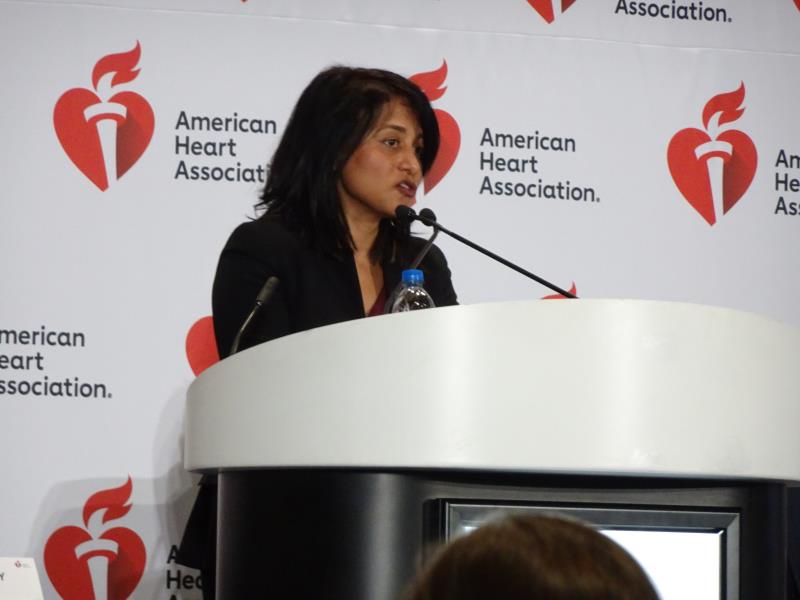 Professor Jean-Claude Tardif
Professor Jean-Claude TardifThe anti-inflammatory drug colchicine at a dose of 0.5 mg/day significantly reduced the risk of ischaemic cardiovascular (CV) events in individuals with a recent myocardial infarction (MI), according to results of the COLCOT* trial presented at AHA 2019.
“Colchicine, at a low dosage of 0.5 mg/day, significantly reduced the risk of first and total ischaemic CV events by 23 percent and 34 percent, respectively, compared to placebo in patients with a recent MI,” said study author Professor Jean-Claude Tardif from the Montreal Heart Institute in Montreal, Canada.
Study participants were 4,745 individuals (mean age 60.6 years, 19.2 percent female, 20.2 percent with diabetes) with a recent MI (≤30 days; mean 13.5 days post-MI) who had been treated as per national guidelines (eg, statins plus antiplatelet agents with or without beta-blockers or renin-angiotensin-aldosterone system inhibitors, and undergone percutaneous coronary intervention if planned). They were randomized to receive colchicine (0.5 mg/day; n=2,366) or placebo (n=2,379).
After a median 22.6-month follow-up, colchicine significantly reduced the risk of the primary outcome of CV death, resuscitated cardiac arrest, MI, stroke, and urgent hospitalization for angina requiring revascularization compared with placebo in the intention-to-treat (5.5 percent vs 7.1 percent; hazard ratio [HR], 0.77, 95 percent confidence interval [CI], 0.61–0.96; p=0.02) and per-protocol populations (5.1 percent vs 7.1 percent; HR, 0.71, 95 percent CI, 0.56–0.90; p=0.004). [AHA 2019, LBS1; N Engl J Med 2019;doi;10.1056/NEJMoa1912388]
The impact of colchicine was evident for all components of the primary outcome (CV death: HR, 0.84; resuscitated cardiac arrest: HR, 0.83; MI: HR, 0.91; stroke: HR, 0.26; urgent hospitalization for angina leading to coronary revascularization: HR, 0.50).
“[However, the main results were] due predominantly to a lower incidence of strokes and urgent hospitalizations for angina leading to coronary revascularization,” said the authors.
The secondary composite endpoint comprising CV death, resuscitated cardiac arrest, MI, or stroke was also reduced in the colchicine vs placebo arm (4.7 percent vs 5.5 percent; HR, 0.85, 95 percent CI, 0.66–1.10). There was no significant between-group difference pertaining to overall death, atrial fibrillation, or deep vein thrombosis or pulmonary embolism.
A total of 154 and 223 primary endpoint events (first and recurrent) occurred in colchicine and placebo recipients, respectively, over the follow-up period, at a rate of 0.29 and 0.42 events per 100 patient-months, respectively (rate ratio, 0.66).
Adverse events (AEs) occurred at a comparable rate between colchicine and placebo recipients (16.0 percent vs 15.8 percent) and were primarily gastrointestinal (17.5 percent vs 17.6 percent). Nausea and flatulence were more common in colchicine than placebo recipients (1.8 percent vs 1.0 percent and 0.6 percent vs 0.2 percent; p=0.02 for both). Serious AE incidence was also comparable between groups (16.4 percent vs 17.2 percent), though colchicine recipients had a higher incidence of pneumonia (0.9 percent vs 0.4 percent; p=0.03).
The findings pertain only to patients with a recent MI and as such, more research is required to identify if the benefits of colchicine extend to other high-risk groups, noted Tardif. The upcoming COLCOT-T2D study aims to assess the effect of colchicine on the same outcomes as in COLCOT but in T2D patients without coronary disease, he added. Longer-term follow-up is also needed to establish the benefits and risks of colchicine over a longer period.
“These landmark results provide confirmation that inflammation management reduces CV risk [and demonstrates] successful repurposing of a broadly available and relatively safe generic drug for a new application,” said discussant Assistant Professor Aruna Pradhan from the Brigham and Women’s Hospital in Boston, Massachusetts, US.
The mechanisms behind these benefits still need identifying, added Pradhan. As colchicine is cleared renally, caution is necessary when using this drug in patients with renal impairment, though it is hoped that future trials will help establish the safety of colchicine in these patients.
 Assistant Professor Aruna Pradhan
Assistant Professor Aruna Pradhan